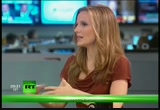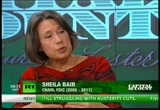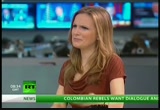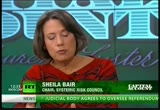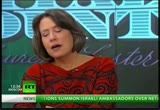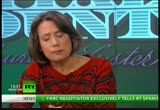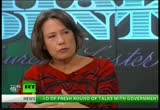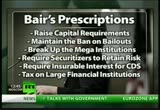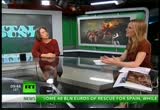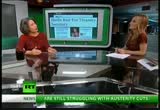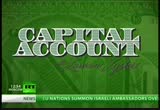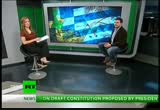tv [untitled] December 4, 2012 3:30am-4:00am EST
3:30 am
stress testing process and that's a good thing that is helpful but we still don't have higher rules requiring higher capital requirements it's pretty much left to regulatory discretion and that's a bad thing i rely on some short term funding that was another problem during the crisis banks excessively relying on on a very short term loans commercial paper repots they would have to continuously roll then of course once the crisis hit everybody got scared nobody was lending to anybody including banks were not lending to each other so trying to have more long term debt is part of the funding balance of these large banks operations had actually gotten worse our knowledge on it has gotten for whatever reason large banks are actually issuing less amounts of sr and secured long term debt than they were a few years ago and this is a mystery because the nonfinancial commercial of these obviously are going very long and they're dudish ones to walk in these very low rates right now but large banks are increasingly using they're using repos more which were not stable during
3:31 am
the crisis and the using insured deposits which creates the government's exposure so there's a lot of problems left that haven't been resolved yes and these are a few things i want to ask about because shadow banking is something that has certainly got your attention from the yeah since the financial crisis and repo as being one part of that in these situations often you have the borrower which is typically like a bank or a financial institution that is regulated borrowing from somewhere that's like a large and regulated player not yet you know from a risk averse back to the institutional level and system why are there the kinds of regulatory issues regulations in place to address counterparty risk that you really are not very many friends or another prime example you know four years later we had to bail out of the many friends and we still don't have it fixed the title one what we call title one this of nations under dodd frank and those are basically the regulators as a council the group with the supermajority to say. this large financial situation
3:32 am
is systemic it begun trouble it would get the rest of us in trouble so we need to put more regulation on there we need to say find out if they can be resolved in bankruptcy without hurting the rest of us that was kind of the type of situation that was meant to address that hasn't happened yet so yes the aspects of the shadow sector have not really been tackled the regulated sector has not really been tackled as much as it should have them and the problem is we're still looking in the rearview mirror trying to get these problems fixed for the credit crisis that we had two thousand and eight whereas moving forward i think the really the interest rate risk and the perhaps unintended consequences of this very protracted period of here's your interest rates that is the kind of the future thing that i'm worried about we're still looking you know backwards to try to fix the two thousand and eight crisis and i think it's just a very problematic situation not program for the next one so how do you think that comes home to where it's well i don't know i you know i've been a critic of the fed's monetary policies i think they're done with the absolutely
3:33 am
the best of intentions but they're not really working that money doesn't go into new lending there's a lot of economic uncertainty there are a lot of banks still nursing legacy loans legacy mortgages and the all the securities what with that the toxic securities on their balance sheet so there are a lot of reasons why you're not getting a lot of new lending and actually perversely i think low interest rates can can hurt for the traditional banks the ones that take deposits to make loans the risk return they're getting on their loans right now because interest rates are so low that inhibits funding it seems easier just to take a cheap deposits maybe reinvest them in government securities or g.o.c. securities than it is to take risk and expression if you're making a loan for several years out with this uncertain interest rate environment it has a very chilling impact on lending and i think it's not really helping the economy and if you're going over lines you don't want to do that for this lower interest rate before you had a higher rate is exactly right so it's for a lot of reasons it has perverse consequences and it is juicing up the bond market you know bomb prices go. out of the stock market goes up because the lower the
3:34 am
bombs you know more resources are are shifted to the stock market so people who own financial assets benefit from this but the broader economy i really can't see that it's doing much yeah i do hear you on that and also on the issue of capital requirements this was one of the major fights of your career with basil to what you were saying hey this is not a great oh yeah it's a lot of banks pretty much decided on a capital year am now of course we do have three and it's seems to be moving for i keep getting a phone which increases i guess my question there is is bigger picture on a system that is so built on credit and will leverage you can you really shore up these banks get them to have more capital without causing a recession yes you can i need to be phased in over time you know the smaller banks what are you do you need to look through the cycle and we got into the crisis with the larger banks that had more leverage that were pulling back and doing so much lending really pulling back on living in an expression of pulling back on credit
3:35 am
lines and that was a huge driver of the recession the smaller banks they had the higher capital levels they really were doing a better job and you see that phenomenon in europe as well so you know you need to you need to have a capital structure a financial structure that would to perform even when you get into the downward side of the cycle everything works when things are good right you can have the leverage in the world when things are good but when things are bad you want to make sure there's enough capital there so it is long term it's in our economic interest and even short term through gradual transition it's not going to hurt lending no monetary policy or fiscal cliff there are a lot of other things that are showing a living much more than. i think it's a great point and i know that you're saying ok we need to look ahead fight the next battle not the last one but i do want to revisit a bit of it because there is still a narrative that exists around tarp which is something that you speak a lot about in your book and kind of the advantages that these big players got you know their access to capital at a time when they may not have had that capital that they were able to raise from private lenders but there is this narrative now that exists i want to play a sound bite you get your take. do you know that taxpayers actually made money on
3:36 am
the wall street bailout. they say may not g.m. but they did on the on the last report about how does that make you feel any differently. so that was an occupy wall street protest awhile back but this idea that the government made money on tarp it really makes my skin crawl i mean you know i hear that and boy that i could it was ok so let's do it again right we may write any yes defense on how you measure the cost if you look at the subsidies you all these benefits taxpayers gave these large institutions who did not make money because as you said earlier some of them couldn't even access the capital markets it in the price so the subsidy to you it was quite large for these programs so there is that the other problem is that you know you can't just look at the discrete stand alone return that we've got on this capital investment the broader damage to the economy caused by the this was in one hundred year flood this recession was caused by some small large institutions doing some really dumb things
3:37 am
and you know it should have happened regulators should have stepped in your earlier the managers really should have been hold to account more than they would have so you know the moral hazard created by bailing them out when it was really their own mistakes that created this is also a substantial cost to society and taxpayers in general more trying to undo that now a lot of dog frank was about trying to get rid of this moral hazard that was created with the bailout so look i'm very glad they made money g.m. is not out of the woods yet he is not out of the woods yet where about one hundred forty billion dollars in the whole fannie and freddie to that wasn't sure but it's still government money so there's still there's still some even on a casual basis there is some cost to be recouped here but you know my fear is when people say that it's like a rationalization and i did what i don't want is for large financial institutions to think they have a big put on the government so they can go out and do this all over again and it's ok when they get in trouble they're going to dump it all back on taxpayers that's
3:38 am
the risk by trying to rationalize all this and saying oh they made money very very bad yeah i hear you and then also there's the other side of it which was the things that banks were asked to do during the financial crisis and actually it was. interesting because recently with the news that bear stearns with there being a civil suit having to do with some fraud we had the opportunity to ask jamie dimon about this deal which you were very incredulous about in your books and so i want to play you what are our producer and get him in his response right. now that there's a civil lawsuit trigger bear stearns related to related fraud. do you regret participating with the federal reserve to buy bear stearns in two thousand names. of the federal reserve because we were asked to by the us a favor to finance some of the no no we did them a favor i mean look at this one exactly right we were asked to do it we did it a great risk to our souls. first obviously the government backed this transaction whether it it asked j.p. morgan to do it or not so it wasn't j.p.
3:39 am
morgan participating with with the fed why did everybody last laugh when we asked that question well you know i think look i think he deserves credit for that point by all published accounts who are not involved in that but the new york fed has never disputed that he was asked to come in and buy buy bear stearns with government assistance the new york fed offered up so i think it is kind of hard to hold them to account for this. and i wish on the bear stearns lawsuit i mean on the other hand they are a big financial situation they have a lot of very well paid lawyers they could have protected themselves from these types of liabilities and the deal documents and maybe was too rushed i don't know but they apparently didn't do that i do wish that there would be more actions braced against the brought against the individuals those opposed to get this had this kind of situation six specially problematic since you were in chains bought the problems they didn't initiate them themselves and the people of yours turns who actually involved i don't think have been sued and how are you going to change
3:40 am
behavior if you don't take the individual people in to have them held to account you just go after the deep pockets well we get money for the government in this case but it may be for investors but the people who actually caused the problem are not we're not held to account you don't change behavior that way so do you believe there should we should see some criminal criminal case i do you know i think your civil actions i think you know going after people's personal pocketbook is also expression for some folks with this wall street mentality and look but a lot of good people in most want to just that but there is kind of a there can be kind of a profit taking culture and so going after their personal assets i think can have a real impact on them as probably as much if not more so than jail time and it's easier to prove in criminal cases you have to prove beyond a reasonable doubt and civil suits or have a lower burden of proof and having people have some skin in the game where it is also morally got it. thank you but yeah we'll talk more about that after the break we'll have more of sheila bair former chair of the f.d.i.c and chair of the systemic risk council also still ahead former greek prime minister george
3:41 am
3:42 am
3:43 am
3:45 am
who. welcome back before the break we talked about the problems that still remain after the financial crisis with the financial system in the banking system now here are some prescriptions from sheila bair former chairwoman the f.d.i.c raise capital requirements maintain the ban on bailouts break up the mega institutions so the big too big to fail require securitize or is to retain risk require insurable interest for c.d.s. meaning you've got to have your skin in the game you've got to insure against what you actually hold no speculation there and a tax on large fanshawe institutions now in terms of the bigger picture what could protect everybody there are more prescriptions let's go ahead and bring those up if we could they include abolishing the g.s.t. stop subsidizing leverage through taxes tax investment income as earned income so these are the capital gains and dividends they get preferential treatment lower rates than just regular old income that you make as like
3:46 am
a doctor and reducing the national debt which is what we hear so much about during this whole fiscal cliff debate so let's bring sheila back in to talk more about these before we get into this i do want to ask what we were talking about when we're going into break and this idea you said there's so much confusion surrounding this barrister and acquisition when i was even done that wasn't even during the crisis but this idea that j.p. morgan did the fed a favor even though it may not have been good for shareholders what does that say about the relationship between government or regulators and the big banks the bank with the fed a favor that maybe wasn't even good for shareholders. this is when i talk about this in the book you know the f.d.i.c deals with troubled banks that we insure we have for decades we have very strict rules. and we discuss resolution and we don't put government money and we don't keep them up when we run them through a government controlled bankruptcy pretty sickly we go up for competitive bidding there are all sorts of special rules of procedures the company by this so it is that transactions who is troubled me i've never understood we were you know we were
3:47 am
in a crisis it was march two thousand and eight there's never going to get analysis of why the new york fed. thought it was systemic that there was some broader rationale because as you say they they didn't what would be the normal market mechanisms work they did this i don't think they put it out for bid shareholders some fuel. for the maybe acquisition and bumped up the price a bit to shareholders so the whole thing i think is troubling and i'm going for it frank we've got a ban on that kind of one off you can't do that anymore frank specifically prohibits it you've got to go through to have it's what any kind of a one off bail out so you can't if an institution gets into trouble it has to go to bankruptcy earth has to go through a government run bankruptcy process which is run by the f.t. i.c. shareholders an unsecured creditors have to take the losses you have to follow a least cost resolution you have to follow competitive pricing policies you have to treat creditors situated creditors the same it's there
3:48 am
a lot of safeguards to assure that you can't do these individual eyes to bailouts and that's not to say you know what the new york fed did may well be justified but i don't think i've ever seen a good analysis of why they thought it was you know march of two thousand and eight to step in i'm going for you can't do that it has to go through a resolution a bankruptcy type process and that all sounds great but my question is with too big to fail institutions that are even bigger and more concentrated than they were before the crisis i have a hard time realistically believing that if one was brought to the brink and it was deemed systemically important or systemically dangerous i have a hard time believing the government wouldn't step in and bail them out well i don't think they would and i think the f.d.a. says put forward the blueprint that they would follow by ceasing the holding company and a lot of people don't understand these these banking organisations are really thousands of legal entities so there's a holding company at the top and then within the larger bank of organisation there can be thousands of entities the lot of them outside the insured bank so that's another reason why in my book they say that we need to simplify those legal
3:49 am
structures and i say break them up i'm really talking about some what we call subsidy arising them so. making them have standalone of these for them breast banking the derivatives to keep the insured bank christian with just lending and payment processing those types of traditional bank commercial banking priorities and by doing that you will make them more resolvable but now yes i believe the f.d.i.c if they had to they can and they would seize control of the holding company and they could continue to fund subsidiary operate operations that were profitable and not insolvent spend the rest of the bankruptcy process so by by funding the holding company you could you could avoid a kind of systemic ramifications so with citi what you're so critical of everything is around in that book and that bank in the book you think if they were failing as politically connected as you know that they wouldn't get how well political elections are absolutely the last reason why you should be selling out and you should never be allowed in this situation because of political connection of course you should know that in happened well you know call me pollyannish but i you know i
3:50 am
believe in this country i believe in the rule of law and i believe you know treating everybody the same that's kind of what democracy is all about so i do think we have the tools and dodd frank in the prohibitions now to prevent that from happening and you know we could have at least you know i asked we could restructure g.m. i could research structure city we can even get a discussion going about it and i'm very glad over time they are working through their problems and they've got new management now and i think the board is doing some really good things at city but you know it's been a long time coming and they were bailed out and so the accountability that you get you know mike mayo said this in his book if you had just taken one like city and put it through a bankruptcy type resolution that would have had a bigger impact than all these hundreds of pages of rules we're doing now yeah and then you know sheila bair maybe the reason some of the things you're saying resonates with people so much that they're asking sheila bair should be treasury secretary we have a we have a i have a line reading just that if we can bring it up but i mean what do you think what would be your first order of business again i do think the fiscal the fiscal
3:51 am
problems we have now are absolutely have got to be the top priority for the treasury secretary. i like erskine bowles i've been talking him up i don't know what the president is going to do but i think someone who can deal with their fiscal problems is really the person that that the president needs a treasury of stature on the hill who can get bipartisan agreement and has proven that he can do so that would be my choice i actually think the treasury department is too involved in financial regulation right now if i was going to change anything and frankly it would be to get the financial stability oversight council into an independent agency and out of treasury because i think tax policy fiscal policy really should be the top for your secretary there's a headline i was referring to would you take that with your you know if anybody would take that job sure but i'm not expecting that i would have written the book that i wrote if i was expecting or angling for that i just got the news issues needed to be aired people need to understand that there were differences and policy choices to be made thank you so much for being on their show.
3:52 am
all right we have a reality check tonight time and time again when we talk about financial regulation and generally the disproportionate burden that seems to fall on smaller firms we do so in generalities well sheila bair is book offer some concrete examples surrounding the financial crisis that we wanted to bring up so in two thousand and six the head of the o.c.c. which is a big bank regulators spearheaded guidance to address the increasing risk in commercial real estate lending so important to address this market was overheating right however a sheila bair notes in her book the regulations have been dropped in a way that would not have much of an impact on the big national banks the o.c.c. regulated rather the primary impact of the c.r.a. guidance would fall on small community banks this is because the concentration or
3:53 am
amount of commercial real estate loans was regulated not the actual quality of the loans and this lending was the bread and butter of some small community banks where there may have been writing great loans but it was about the concentration and big banks were more diversified even though they might not have had great underwriting standards also in the midst of the crisis the f.c.c. placed restrictions on short selling shares of the largest u.s. banks as were betting their stock price will go down this was in an effort to restore falling stock prices however consequently much of the short selling was directed toward smaller publicly traded banks so as sheila bair notes she complained that by protecting only the big institutions it was creating more downward pressure on the shares of smaller institutions even though the head of the s.e.c. later admitted he regrets some of the actions he took including the short selling ban and this is just one more case in which so many of the policies pursued during the crisis protected the big. and let the little guys fend for themselves sheila
3:54 am
bair is words they're not even mine and that's a reality check. what's up with loose change and this story is right up to me trees alex i'm glad you're here because former great prime minister george papandreou eighty nine year old mother was reportedly discovered to be the owner of a swiss bank account containing five hundred million euro she is connected to that count reportedly the telegraph reported it this comes after the greek government has declared they're going after tax evaders. last week greece's financial police will get on one of the athens poshest neighborhoods declaring war on what the government calls of culture of cheating the state to target tax dodging doctors.
3:55 am
ok well dimitri what is this symbolic of i mean she has denied it i believe to these papers i do need to get that in there. because then i heard was these are the she said a lot of lies but the one thing that was remarkable was essentially that maybe these attacks are coming against me because we haven't effectively. plundered the state or whatever it is our family has been you know we haven't plundered it was a little different but forget the translation but the point is that i think that she's old she probably doesn't even know where her money is. i'm not doubting at all that she has money on this account i don't could be legal no i don't i don't think you i am sure i would imagine there's a good amount of money that greek families that are in politics have invested abroad that is not legal ok because they have been. career politicians and greece is a club doctor see has been for many decades out of either
3:56 am
a family has been in power for a very long time so i think that it's and the reason was was five thousand about that sought is this myth of tax evasion and let's go after doctors let's go after you know which is were problems which is a i've use ition go after these people but not quite for the elites who are in charge of the reforms because the reality is if you really want to get the crux the problem it's the people that have to address the problem that are the problem so you won't get anywhere how do you address that band will leave with those wise words from dimitri because that is all we have time for thank you so much for watching be sure to come back tomorrow and the meantime you can follow me on twitter at lauren lyster you can like our facebook page there's the address give us feedback had any shows you missed it you tube dot com slash capital account watch as an h.d. on hulu there is the address there and have yourself a fantastic evening.
3:57 am
show and an issue. doesn't matter you. left the residue never from the. notion of coming all the signature there and you look up and there's one tapping on you he's the alpha beta gamma he was all the the fun now trying to treat he's let me go out there know what's going on so you could pinpoint. the dirt right now. dog shows become income mortal danger. piece of art. and. symptom free. too.
3:58 am
3:59 am
28 Views
Uploaded by TV Archive on

 Live Music Archive
Live Music Archive Librivox Free Audio
Librivox Free Audio Metropolitan Museum
Metropolitan Museum Cleveland Museum of Art
Cleveland Museum of Art Internet Arcade
Internet Arcade Console Living Room
Console Living Room Books to Borrow
Books to Borrow Open Library
Open Library TV News
TV News Understanding 9/11
Understanding 9/11
